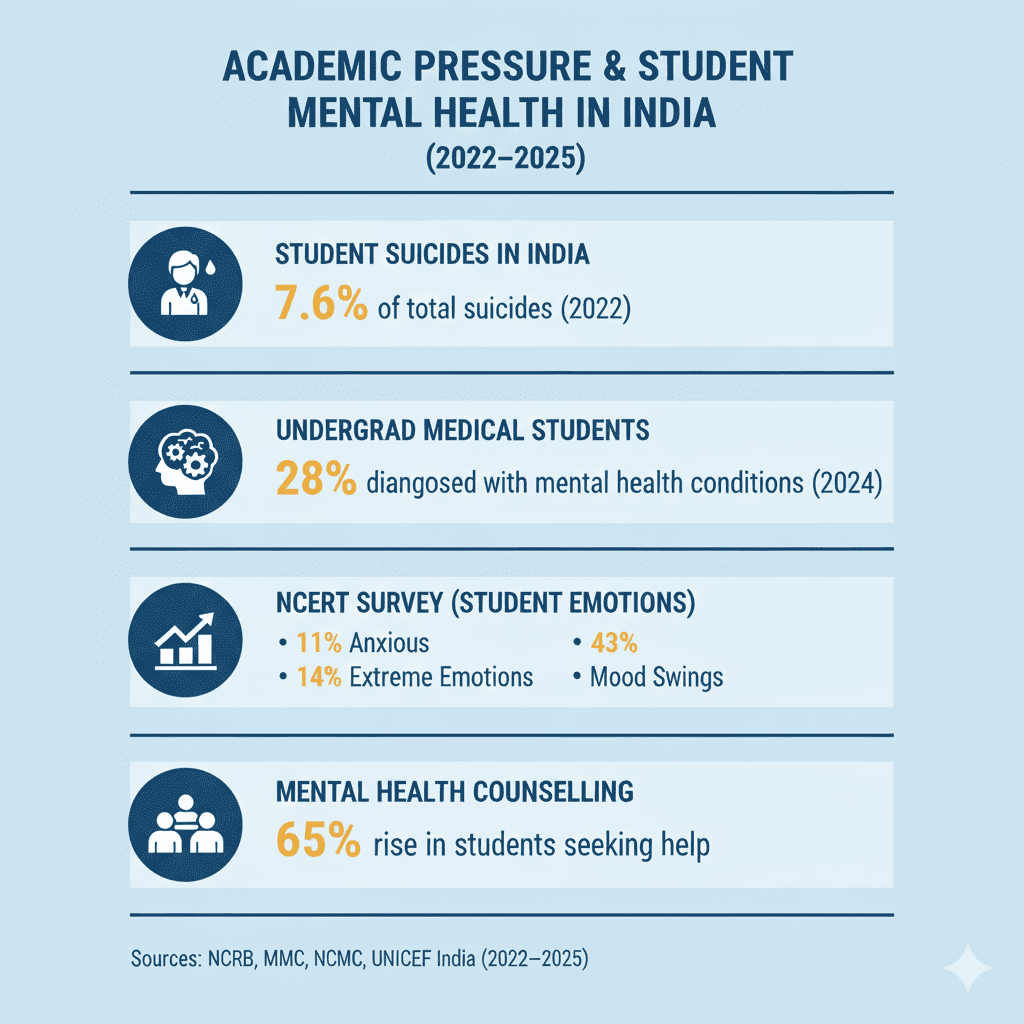Academic Pressure in Indian Students: Ways to Deal with Anxiety

Infographic: Key statistics showing academic pressure & mental health among Indian students. Sources: NCRB, NMC, NCERT, UNICEF India.
Causes of Student Stress
- An exam-centric system: Success is often measured by marks and ranks rather than practical skills.
- Parental and societal expectations: Cultural emphasis on certain careers can push students toward undue stress.
- Cut-throat competition: Limited seats in top colleges and high-stakes entrance exams increase pressure to overperform.
How Stress Affects Students
High academic pressure can lead to anxiety, insomnia, panic around tests, and reduced concentration. Consequently,these symptoms affect both performance and long-term wellbeing.
Key Causes of Academic Stress in Indian Students
- Fear of failure: Students often fear disappointing parents or losing social standing.
- Poor coping strategies: Without stress management skills, small setbacks feel overwhelming.
- Social comparisons: Peer success and social media create unrealistic benchmarks.
- One-dimensional evaluation: Exams become the only measure of ability, sidelining other talents.
Signs of Academic Pressure and Anxiety in Indian Students
- Persistent tiredness or sleep disturbances
- Loss of interest in previously enjoyed activities
- Sharp drop in academic performance or sudden irritability
- Physical complaints like repeated headaches or stomachaches
- Avoidance of school or social withdrawal
Ways to Deal with Academic anxiety in students
- Open communication: Encourage honest conversations about fears and goals without judgment.
- Balanced routines: Prioritize sleep, breaks, exercise, and healthy meals.
- Study smart, not only hard: Use active recall, spaced repetition, and short focused sessions.
- Mindfulness & breathing: Short meditation or breathing exercises can reduce acute stress.
- Normalize professional help: Counseling and therapy are valuable tools. For guidance, see WHO: Adolescent Mental Health.
How Schools Can Reduce Academic Pressure in Indian Students
- Integrate life-skills and mental health education into the curriculum
- Offer accessible counsellors and early intervention programs
- Use holistic assessment systems that value creativity, projects, and collaborative skills
Shail-Satya Foundation Programs for Academic Pressure in Indian Students
We run awareness drives, workshops for parents & teachers, and youth counselling camps focused on stress management and resilience. Learn about our programs. More data available at UNICEF India.
Conclusion — A Call to Action
Academic success should not cost young people their mental health. By changing expectations, teaching ways to deal with academic pressure, and providing timely support, education can be healthier and more fulfilling. Start one small change today: a 10-minute conversation, a short breathing break, or a referral to a counsellor.
Join us: Contact Shail-Satya Foundation.




Leave a Reply
You must be logged in to post a comment.